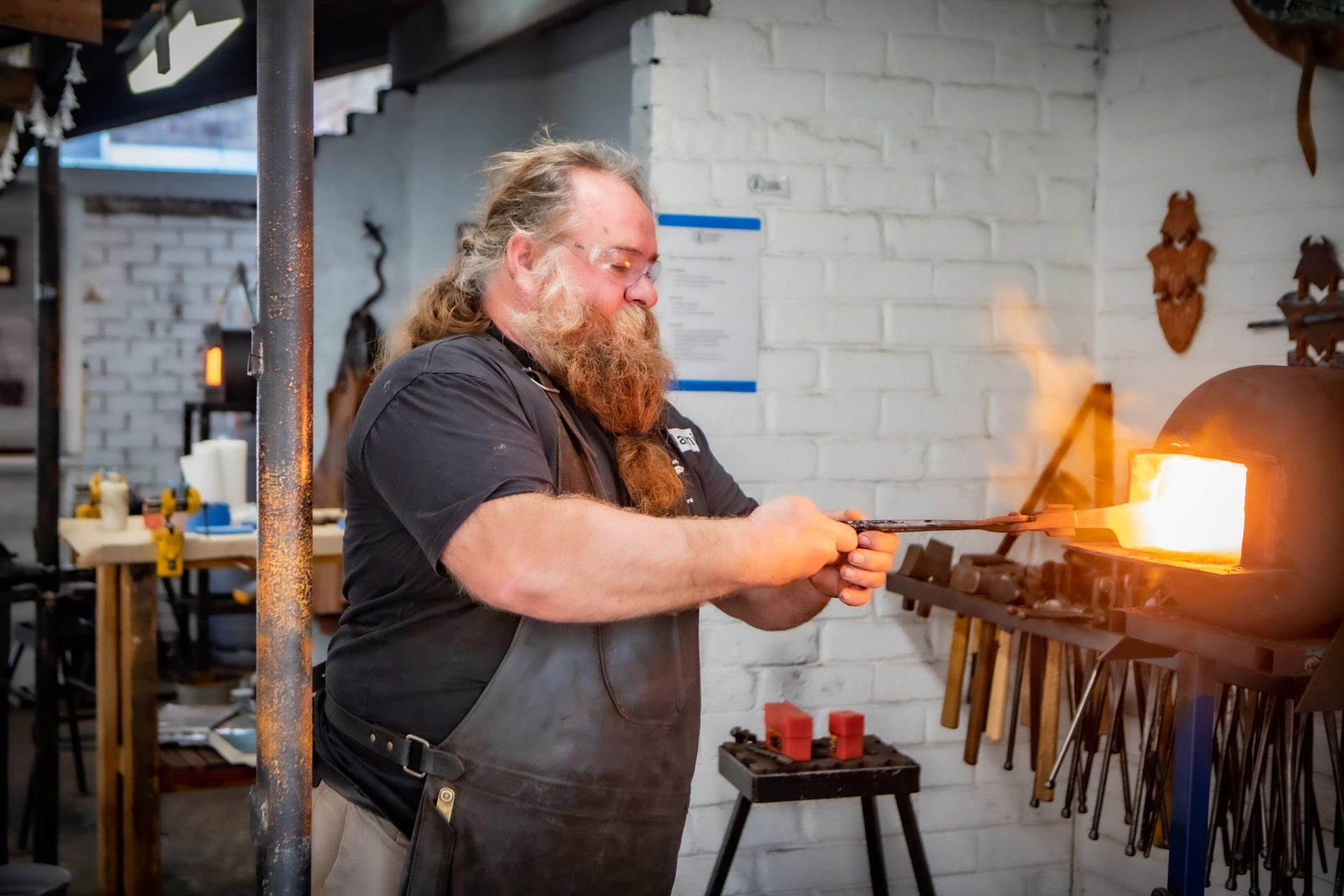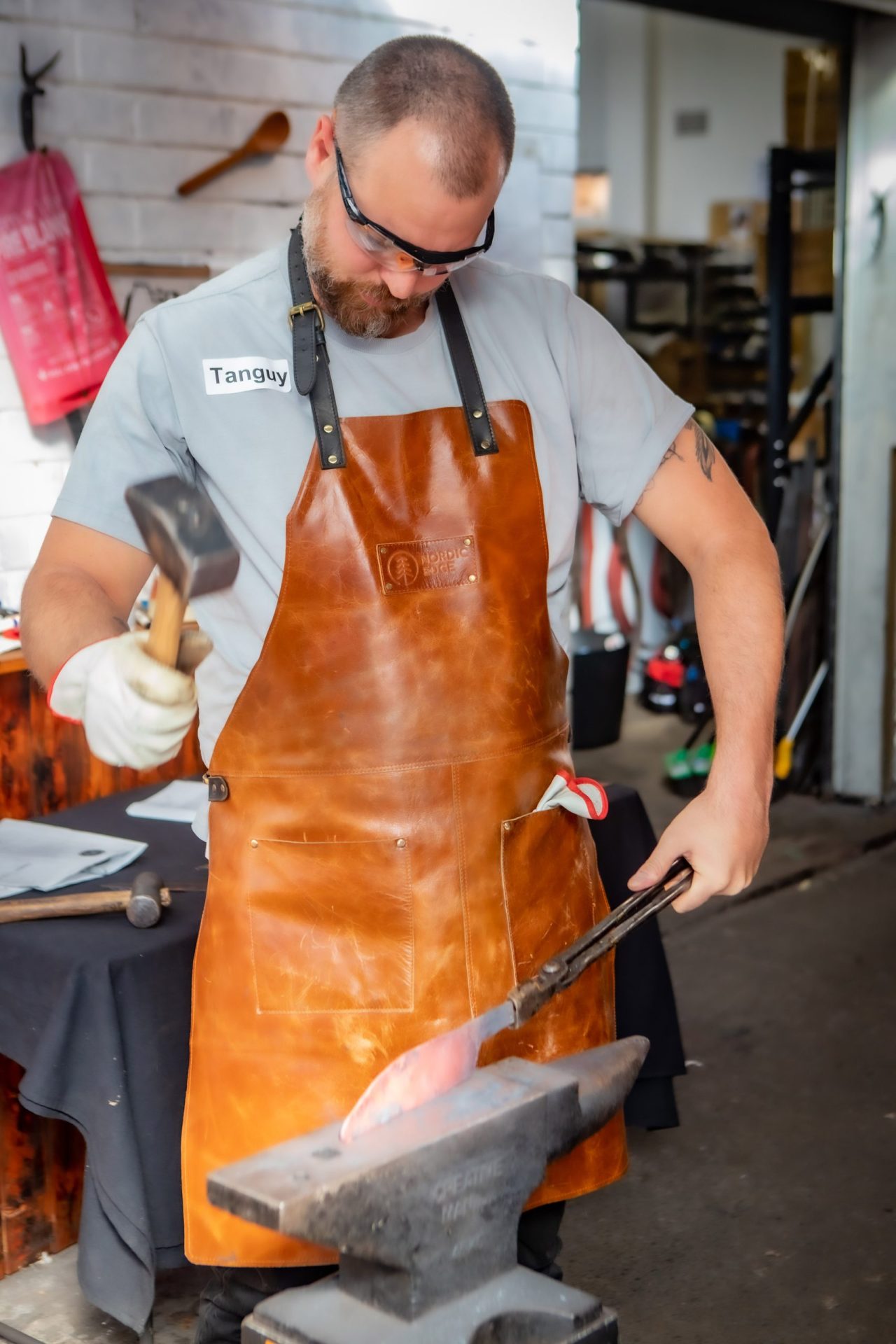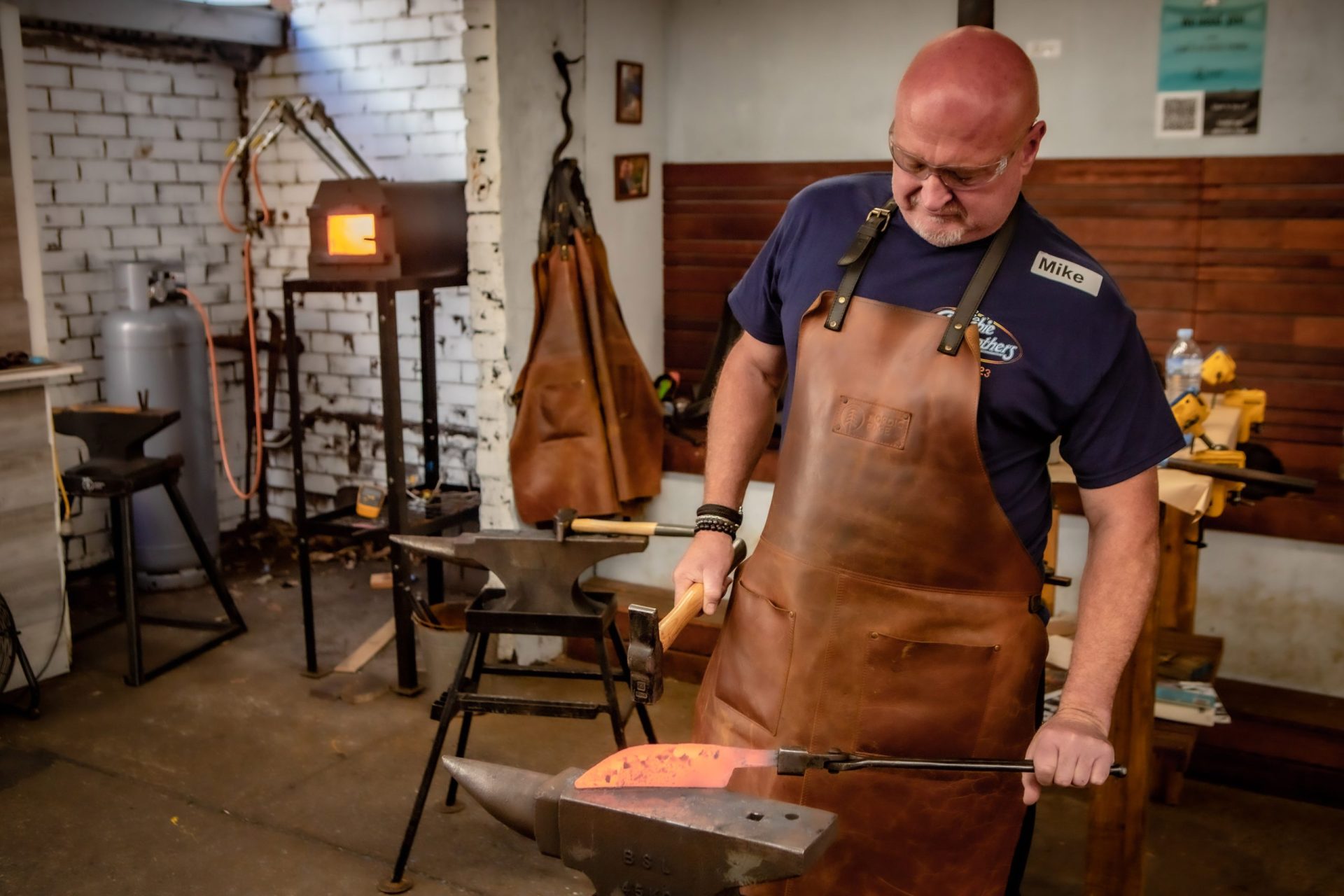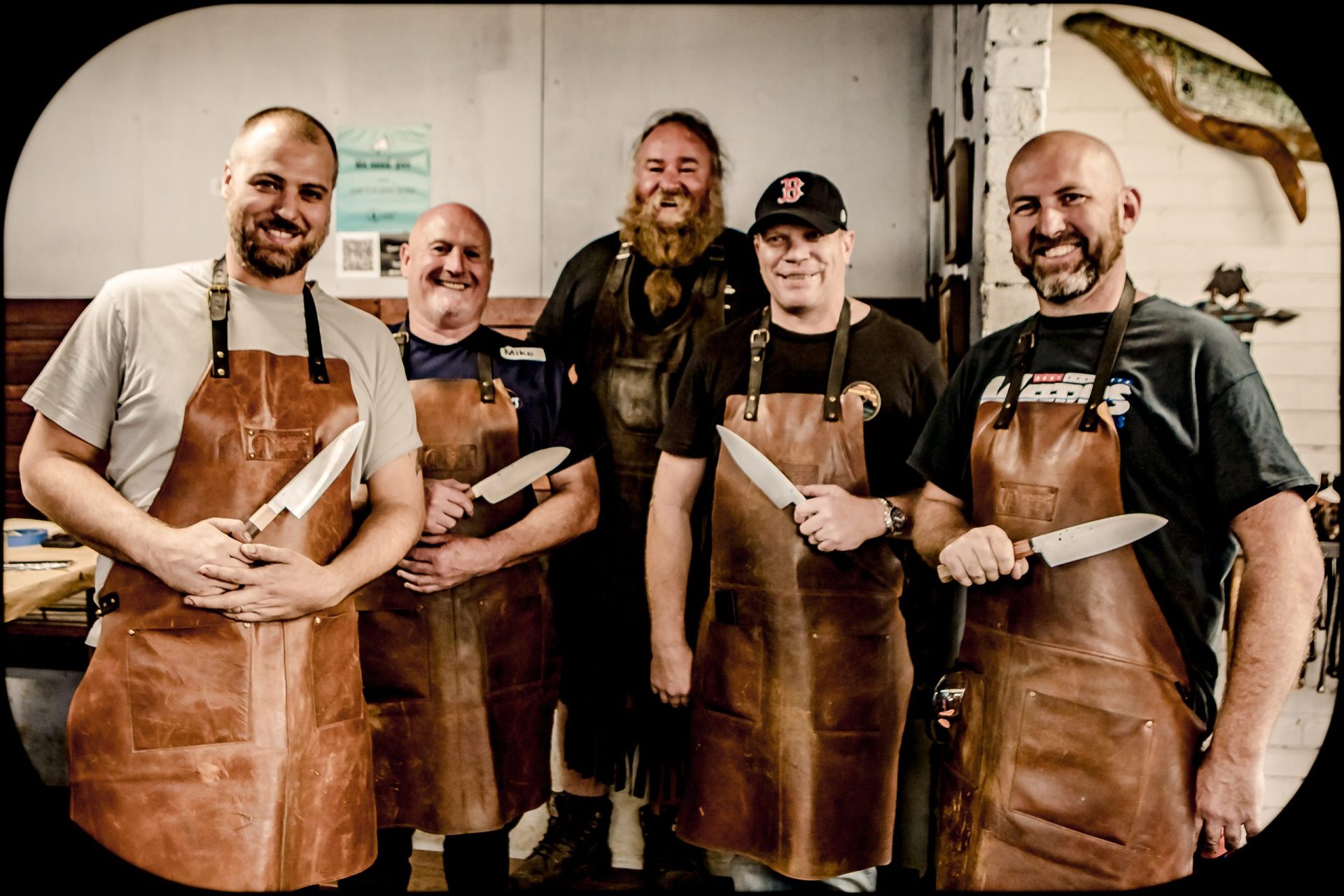In one nook of our ever-eclectic Brookvale, you’ll find Bjorn Jacobsen teaching locals the lost art of blacksmithing, knife making and spoon carving.
The Norwegian launched Nordic Edge to breathe new life into the ‘smithy’ world, to revive the craft of working using raw steel using traditional methods, under the guidance of a professional blacksmith.
A ‘smithy’, of course, is a blacksmith’s workshop, now more commonly referred to as a ‘forge’. An ancient word, in the Middle Ages ‘Smith’ became an occupational name for someone who worked with metal, and is now the most common surname in Britain (it is also the 2nd most common surname in Australasia).
But like many skilled trade professions, bespoke metalwork – from the historic hammering-out of swords and horseshoes to the creation of cutlery and assorted fixings and fencing – has declined. This downturn in artisanship accelerated in recent years when the Industrial Age ceded to the Computer Age, with the advent of programmable machines run by unskilled operators.
So why, in this little corner of Brookvale, is a smithy forging ahead (excuse the pun!) against the tide of deskilling? Manly Observer spoke to founder Bjorn Jacobsen to learn about his cutting-edge operation.

How long has the Brookvale forge been operating?
“Nordic Edge has been doing workshops in “the lost arts” of blacksmithing, knife making and spoon carving for 3 years or so,” he said.
Where does the name Nordic Edge come from?
“I started this as a little side-project, a website to sell Scandinavian knife kits I brought in from back home [in Norway]…
“So it kept growing and now Nordic Edge has quite a lot of tools and supplies for hobby-makers, from blacksmithing equipment like power hammers, anvils and tongs, to spoon-carving axes, kitchen knife blades and leather-working tools.

“Nordic Edge hints at the Nordic heritage of myself and Marie, who run the company, aiming at giving hobby makers ‘the edge’ in tools and supplies.”
Cutting-edge idea
What inspired Bjorn to set up the knife-making workshops, which have proved very popular?
“Every now and then we would have someone wanting to come and make a chef knife so we thought, ‘why not try listing some workshops?’ It has worked out great; we run workshops most weekends now and it is great fun…
“It is amazing to take someone on a journey of forging and grinding their own chef knife and seeing it take shape during the workshop. Most people are blown away at the end of the day by their result, by how cool their design ends up.”

How many different designs can people choose from for their chef knife?
“Probably the coolest thing about the chef knife-making workshop is how different many of the knives end up. Everyone starts with the same piece of steel and goes through the same steps, but each student will add their own design and personality.
“There is no limit to the types of chef knife you can make, by forging the tip and blade profile towards a picture you have in your mind’s eye. And we help you get there.”
What can someone enrolling in a workshop expect?
“The workshop is quite a bit of work. It starts at 8am with a safety briefing, then we select lunch from the menu of the awesome guys at Fuel Espresso Bar. We jump into leather aprons and personal protective equipment (PPE) before each student is handed a piece of high-carbon 1084 steel.
“Forges go on, it gets hot and loud while we go through the steps necessary to shape the piece of steel into a chef knife blade by hammer and anvil. It is hot work, but does not require any previous experience.
“After forging, we heat-treat the blades; this is the ‘birth of the blade’ and can be quite stressful. A ‘ping’ here means part of your blade is left in the quench oil!”

Bjorn continued, “If everything goes well, we have lunch and then it is on to the grinding. Each student will grind their own blade to their design (profile) and then grind the bevels.
“When done, we come out of the grind room and can remove the dust masks, before gluing on Japanese-style wooden handles.
“Then the students can relax and share their thoughts on their day while having a soda or beer, waiting for the glue to set. When ready, we sharpen their forged high-carbon chef knives and send them home, proudly bringing home the result of their long day.”
Other workshops
What other workshops does Bjorn host at Nordic Edge in Brookvale?
“In addition to the forged chef knife workshop, we hold a blacksmithing workshop which is either a 3-hours or full day thing, as well as a spoon-carving workshop.
What do these involve?
“The blacksmithing workshops are a short and a longer version of very similar content; learning about blacksmithing tools and techniques, then putting this into practice.
“The spoon-carving is a much slower day; many come in pairs for this one, bringing a friend along to sit and carve and catch up for a nice, relaxed day. Each student goes home with new skills, their own kitchen serving spoon as well as the set of spoon-carving knives to keep so they can keep carving.”

Anything else he’d like to add?
“We are blown away by the positive feedback we are receiving from people on the Northern Beaches, from people coming along for a workshop and loving the experience. We are very lucky to be able to do this as a hobby-business and love seeing the students become proud and happy with what they are making at the workshops.”
Ages of iron
The Hittite empire of Central Europe believed to be the first civilisation that began smelting iron ores around 1500BC. However, it was not until around 500AD in China and 1500AD in Europe that charcoal-burning blast furnaces were able to be bellowed hot enough to fully melt iron into a pourable liquid – creating cast iron.
This led, inevitably, to the manufacture of stronger weaponry (body armour, swords that weren’t brittle or prone to bend, gun barrels and canons) and simultaneously enabled decent, heat-resistant cookware (pots and pans).
Prior to the Industrial Revolution, smithies operated in most villages throughout Europe, providing essential implements, such as tools and carriage components. Many artisan metalworkers were travelling people who roamed the country with hammers and tongs, a portable anvil, bellows to heat a forge, and a rope-powered lathe.

Nordic Edge
Unit 4, 13-15 Mitchell Road, Brookvale (entry on Chard Rd).
Webpage/booking: https://nordicedge.com.au/
Facebook: https://www.facebook.com/NordicEdgeComAu
YouTube: https://www.youtube.com/watch?v=-C7QUj7ONr0
Instagram: https://www.instagram.com/nordic_edge/
History of blacksmithing




